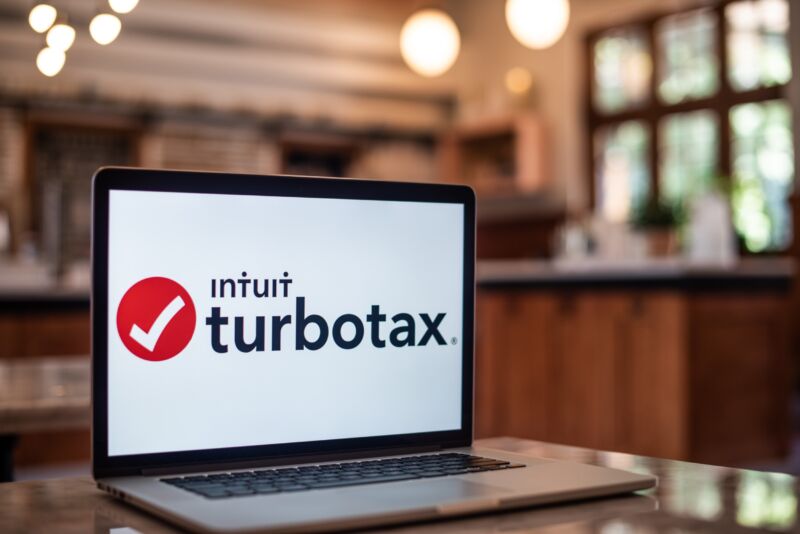
Getty Images | Bloomberg
The Federal Trade Commission yesterday ruled that TurboTax maker Intuit violated US law with deceptive advertising and ordered the company to stop telling consumers that TurboTax is free. Intuit “engaged in deceptive advertising in violation of FTC law and deceived consumers when it published advertisements for 'free' tax products and services that many consumers did not qualify for,” the FTC said in a statement. Notice its conclusion.
FTC commissioners voted 3-0 to issue a final order affirming the FTC's Chief Administrative Law Judge's September 2023 ruling against Intuit.
“The Final order of the Commission Intuit prohibits advertising or marketing that any product or service is free to all consumers or unless it clearly and conspicuously discloses the percentage of taxpayers or consumers who qualify for the free product or service as a “free” claim. . “Alternatively, if the product or service is not free to the majority of consumers, it may reveal that the majority of consumers are not eligible,” the FTC said.
The FTC said Intuit must “clearly and clearly disclose all terms, conditions, and obligations necessary to obtain a 'free' item or service.” For ads that don't have enough space to include all terms and conditions, Intuit must “disclose that most consumers do not qualify for free (if true) or a percentage that provides a link in that space. Restricted online ads detailing all terms and conditions.”
Intuit says it will beat the FTC in court
Intuit has repeatedly criticized the FTC's administrative process, in which FTC officials rule on complaints filed by the FTC. The software company will appeal yesterday's ruling to the Federal Court of Appeal. Intuit said.
“The U.S. Federal Trade Commission (FTC) commissioners unsurprisingly announced that they have ruled in their favor in a lawsuit filed against Intuit. Intuit is immediately appealing the decision, and we hope to prevail when the matter returns to a neutral body,” the company said.
Intuit has defended its practices, saying it has “helped more than 124 million Americans file their taxes for free” and has “always been clear, fair, transparent and committed to free tax preparation with its customers.”
Intuit has Said before It “already adheres to most advertising practices” required by the FTC. Intuit said yesterday, “The FTC's order does not involve monetary penalties, and Intuit does not expect a significant impact on its business.”
FTC dismisses due process complaint
The FTC order rejected Intuit's claim that the agency process was biased. Intuit said the commission's “dual role in the administrative adjudication process, in which 'the commissioners who authorized the filing of a complaint against Intuit now determine its merits,' creates an 'unconstitutional possibility of bias' that violates due process,” the FTC said. The Supreme Court has rejected the notion that the combination of functions creates an unconstitutional risk in administrative judgment.”
The FTC cited 1975 judgment of the Supreme Court Inside Withrow v. Larkin, which includes the Wisconsin State Board of Examiners, which is empowered to punish physicians for professional misconduct. “As the court explained, 'it is common for members of administrative agencies to receive results of investigations, approve charges or formal complaints to initiate enforcement actions, and participate in subsequent investigations. This practice … does not violate due process of law,'' the FTC order said.
FTC Bureau of Consumer Protection Chairman Samuel Levine Reported Commending the commissioners' vote yesterday:
The Commission has issued an order setting clear standards for Intuit to follow. They need to stop the deceptive advertising and tell the truth about how many people actually qualify for the supposedly “free” products. This directive sends a message across the industry that “free” means free – not “free for the few” or “free for the few”. Businesses can expect FTC enforcement action if they use the “free” power in the dishonest way that Intuit did.
Intuit's disclaimers that its tax-filing product is free only for “simple income” are vague and unclear, Levine added:
In its opinion, Intuit's claims that TurboTax is a “free” service are completely unsupported, and the Commission conducted its own review of the facts and law to conclude that most tax filers are not eligible for the “free” version. Service. Instead, they were upgraded to costlier deluxe and premium products. As the Commission has long understood, “free” is a powerful lure that Intuit used in many advertisements. Its attempts to qualify its “free” claim are futile and often vague. The commission found that Intuit's “'simple income only' disclosure is clear and unambiguous” and “does not change the strong and powerful net impression of free advertising.”